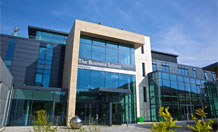Articles

University of Exeter Business School
Circular Economy Disruptions – Past, Present and Future Symposium
On the 17th-19th June 2018, the University of Exeter, with support from the Ellen MacArthur Foundation, is hosting the world’s first International academic symposium on the circular economy.
Peter Hopkinson, conference chair and Professor in Circular Economy at the University of Exeter, and conference keynote Andrew Morlet, Chief Executive of the Ellen MacArthur Foundation are both available for interview to talk about the symposium itself, and comment on the opportunities and challenges of a circular economy approach.
The circular economy creates value by keeping products and materials in use, designing out waste and pollution, and regenerating natural systems. Estimates show that it has the potential to be worth $1 trillion to the global economy.
“Now more than ever, when there is huge pressure on resources and ecological systems, different business, economic and social approaches have to be adopted. While the circular economy is in its early days, the changes and innovations will come rapidly. The Circular Economy Disruptions – Past, Present and Future symposium will look at how circular economy is already being adopted by leading organisations, the huge opportunities it presents and the major challenges that need to be met, to enable it to become mainstream business practice,” comments Peter Hopkinson, Professor in Circular Economy at the University of Exeter.
Among the topics the symposium will consider are:
- Disruptive technology and business models that can create and advance circular economy
- Education and learning in the transition to a circular economy
- Implementing circular economy for economic development in developing countries
- Organisational structures and circular strategies
- Which forms of entrepreneurship is the circular economy triggering
- Circular cities in the 21st century, how are they defined and best practice
- Circular economy implications and responses for different industry sectors, public policy, and civic society
Peter Hopkinson is Director of the University of Exeter Centre for Circular Economy, which brings together academic researchers, business, policy makers and civic society to support the transition to a circular economy. He set up and ran the world’s first MBA in circular economy and a global online executive education programme for leading global businesses, innovation companies and educators. He is focussed on developing the scientific evidence base for circular economy theory and practice at varying scales and within different industrial contexts. The University of Exeter is a member of the Ellen MacArthur Pioneer University Network.
Andrew Morlet joined the Ellen MacArthur Foundation in 2013 to develop its business programmes including the CE100, a worldwide innovation platform that brings together large corporates, emerging innovators, government bodies and academic partners to define and launch initiatives to accelerating the transition to a circular economy. He became Chief Executive in 2014.
Andrew has over 25 years’ experience in leading development of business strategy, previously as global managing director for information and technology strategy at Accenture, and as a partner with McKinsey & Company, where he developed board level strategy, working with leading global companies across multiple sectors in the USA, UK/Europe, Asia and Asia-Pacific. Prior to this Andrew worked in the not-for-profit sector as an HIV clinical epidemiology and healthcare research scientist.
Date: 15 June 2018
